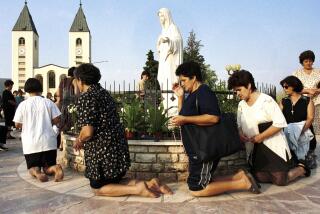Vietnam’s religious revival
- Share via
CATHOLIC WORSHIP IS FLOURISHING in Vietnam, a sign that the Communist Party’s repression of religion is easing. As Vietnam’s leaders push for faster economic growth, they are finding that a swifter flow of money requires and creates more openness and less political control over people’s private matters.
Amen to that. After decades of restricting religious activity and imprisoning people for their beliefs, even a modest improvement is welcome and overdue. Denying people the basic decency of choosing how they worship has been a hallmark of communist regimes everywhere. In Vietnam, change is coming with the arrival of market mechanisms and the desire for more of them. Its economy grew 8% last year, and its leaders want to join the World Trade Organization, which requires obtaining support from countries that care about religious freedom.
In recent months, Vietnam’s leaders have taken steps to ease restrictions on Catholicism. A special envoy from Rome made the first visit by a senior official from the Vatican since 1954 and presided over the ordination of 57 priests at a ceremony in Hanoi. Catholic organizations report swelling attendance at Mass all over Vietnam. The exact number of Catholics in Vietnam is unknown; estimates range from 5 million to 9 million -- in a nation of 83 million.
In theory, Vietnam allows freedom of religion. In practice, communist authorities are highly suspicious of any organization they do not control. The legacy of French colonial rule, and the Vatican’s support for South Vietnam during the Vietnam War, only made Hanoi more mistrustful of Catholics. Human rights organizations have documented numerous cases of religious activists in Vietnam being forced to recant and sometimes being tortured.
Hanoi has been particularly tough on Montagnard Christians -- evangelicals who have demanded a return of ancestral lands in the nation’s central highlands. When Vietnam’s prime minister, Phan Van Khai, visited Washington last summer to talk about WTO accession, he met strong demands to ease religious persecution. Khai returned home to oversee the release of political prisoners and to issue a decree banning forced recantations of faith.
Westerners are sometimes perplexed by why people in Asia would flock to a religion with a salvation narrative set in the Middle East. And Buddhism remains dominant in Asia. Yet spiritual matters follow unpredictable paths, and common decency requires that people be allowed to choose any faith.
More to Read
Sign up for Essential California
The most important California stories and recommendations in your inbox every morning.
You may occasionally receive promotional content from the Los Angeles Times.













